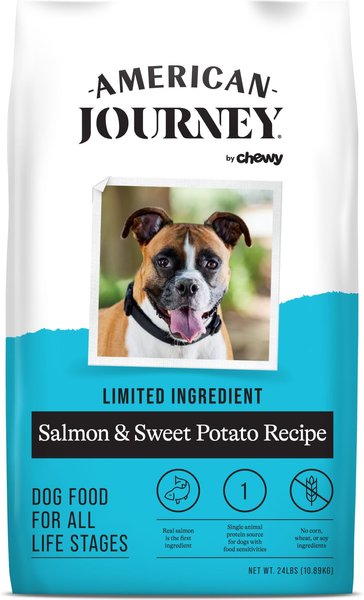
DogFoodAdvisor is reader supported See how
All reviews are 100% impartial but if you buy using links on this page, we may earn a referral fee.
Our Verdict
American Journey Limited Ingredient dry product range is made up of five recipes with ratings varying from 3 to 4 stars. The average rating of the whole range is 4 stars.
The table below shows each recipe in this range including our rating and the AAFCO nutrient profile: Growth (puppy), Maintenance (adult), All Life Stages, Supplemental or Unspecified.
Recipe and Label Analysis
American Journey Limited Ingredient Salmon and Sweet Potato was selected to represent the other products in the line for detailed recipe and nutrient analysis.
American Journey Limited Ingredient Salmon and Sweet Potato
Estimated Dry Matter Nutrient Content
Protein
Fat
CarbsCarbohydrates
Deboned salmon, salmon meal, peas, chickpeas, sweet potatoes, natural flavor, canola oil (preserved with mixed tocopherols), dried plain beet pulp, canola meal, flaxseed, pea starch, dicalcium phosphate, fish oil, salt, calcium carbonate, sunflower oil, potassium chloride, choline chloride, vitamins (vitamin E supplement, niacin supplement, d-calcium pantothenate, vitamin A supplement, riboflavin supplement, thiamine mononitrate, pyridoxine hydrochloride, vitamin B12 supplement, folic acid), l-threonine, minerals (ferrous sulfate, zinc proteinate, zinc sulfate, iron proteinate, copper sulfate, sodium selenite, copper proteinate, manganese sulfate, manganese proteinate, calcium iodate), taurine, mixed tocopherols (preservative), rosemary extract
Fiber (estimated dry matter content) = 6%
Red denotes any controversial items
| Estimated Nutrient Content | |||
|---|---|---|---|
| Method | Protein | Fat | Carbs |
| Guaranteed Analysis | 25% | 12% | NA |
| Dry Matter Basis | 28% | 13% | 51% |
| Calorie Weighted Basis | 25% | 29% | 46% |
Ingredients Analysis
The first ingredient in this dog food is salmon. Although it is rich in omega-3 fatty acids, raw salmon contains up to 73% water. After cooking, most of that moisture is lost, reducing the meat content to just a fraction of its original weight.
After processing, this item would probably account for a smaller part of the total content of the finished product.
The second ingredient is salmon meal. Because it is considered a meat concentrate, fish meal contains almost 300% more protein than fresh fish itself.
Fish meal is typically obtained from the “clean, dried, ground tissue of undecomposed whole fish and fish cuttings” of commercial fish operations.1
The third ingredient includes peas. Peas are a quality source of carbohydrates. And like all legumes, they’re rich in natural fiber.
However, peas contain about 25% protein, a factor that must be considered when judging the meat content of this dog food.
The fourth ingredient lists chickpeas, also known as garbanzo beans. Like peas, beans and lentils, chickpeas are a nutritious member of the fiber-rich legume (or pulse) family of vegetables and contain about 22% protein, a factor that must be considered when judging the actual meat content of this dog food.
The fifth ingredient is sweet potato. Sweet potatoes are a gluten-free source of complex carbohydrates in dog food. They are naturally rich in dietary fiber and beta carotene.
After the natural flavor, we find canola oil. Unfortunately, canola can be a controversial item. That’s because it can sometimes (but not always) be derived from genetically modified rapeseed.
Yet others cite the fact that canola oil can be a significant source of essential omega-3 fatty acids.
In any case, plant-based oils like canola are less biologically available to a dog than fish oil as a source of quality omega-3 fats.
The eighth ingredient is beet pulp. Beet pulp is a controversial ingredient, a high fiber by-product of sugar beet processing.
Some denounce beet pulp as an inexpensive filler while others cite its outstanding intestinal health and blood sugar benefits.
We only call your attention here to the controversy and believe the inclusion of beet pulp in reasonable amounts in most dog foods is entirely acceptable.
The ninth ingredient is canola meal, a by-product of canola oil production more typically used to make feed for farm animals and to produce biodiesel.
Unfortunately, canola can be a controversial item. That’s because it can sometimes (but not always) be derived from genetically modified rapeseed.
In any case, because canola meal also contains about 37% dry matter protein, this ingredient would be expected to notably boost the total protein reported on the label — a factor that must be considered when judging the actual meat content of this dog food.
From here, the list goes on to include a number of other items.
But to be realistic, ingredients located this far down the list (other than nutritional supplements) are not likely to affect the overall rating of this American Journey product.
With six notable exceptions…
First, we find flaxseed, one of the best plant sources of healthy omega-3 fatty acids. Provided they’ve first been ground into a meal, flax seeds are also rich in soluble fiber.
However, flaxseed contains about 19% protein, a factor that must be considered when judging the actual meat content of this dog food.
Next, we note the use of sunflower oil. Sunflower oil is nutritionally similar to safflower oil. Since these oils are high in omega-6 fatty acids and contain no omega-3’s, they’re considered less nutritious than canola or flaxseed oils.
Sunflower oil is notable for its resistance to heat damage during cooking.
There are several different types of sunflower oil, some better than others. Without knowing more, it’s impossible to judge the quality of this ingredient.
In addition, we find no mention of probiotics, friendly bacteria applied to the surface of the kibble after processing to help with digestion.
We also note the use of taurine, an important amino acid associated with the healthy function of heart muscle. Although taurine is not typically considered essential in canines, some dogs have been shown to be deficient in this critical nutrient.
Since taurine deficiency appears to be more common in pets consuming grain-free diets, we view its presence in this recipe as a positive addition.
Next, this recipe contains sodium selenite, a controversial form of the mineral selenium. Sodium selenite appears to be nutritionally inferior to the more natural source of selenium found in selenium yeast.
And lastly, this food includes chelated minerals, minerals that have been chemically attached to protein. This makes them easier to absorb. Chelated minerals are usually found in better dog foods.
Nutrient Analysis
Based on its ingredients alone, American Journey Limited Ingredient Dog Food looks like an above-average dry product.
The dashboard displays a dry matter protein reading of 28%, a fat level of 13% and estimated carbohydrates of about 51%.
As a group, the brand features an average protein content of 26% and a mean fat level of 13%. Together, these figures suggest a carbohydrate content of 52% for the overall product line.
And a fat-to-protein ratio of about 51%.
Near-average protein. Below-average fat. And above-average carbs when compared to a typical dry dog food.
Even when you consider the protein-boosting effect of the peas, chickpeas, canola meal and flaxseed, this looks like the profile of a kibble containing a moderate amount of meat.
American Journey Dog Food Recall History
The following automated list (if present) includes all dog food recalls related to American Journey through July 2024.
No recalls noted.
You can view a complete list of all dog food recalls since 2009 here.
Our Rating of American Journey Dog Food
American Journey Limited Ingredient is a grain-free dry dog food using a moderate amount of named meat meals as its dominant source of animal protein, thus earning the brand 4 stars.
Compare American Journey Dog Food
How does American Journey compare with The Dog Food Advisor's most recommended brands?
A Final Word
The Dog Food Advisor does not accept money, gifts, samples or other incentives in exchange for special consideration in preparing our reviews.
However, we do receive a referral fee from online retailers (like Chewy or Amazon) and from sellers of perishable pet food when readers click over to their websites from ours. This helps cover the cost of operation of our free blog. Thanks for your support.
For more information, please visit our Disclaimer and Disclosure page.








